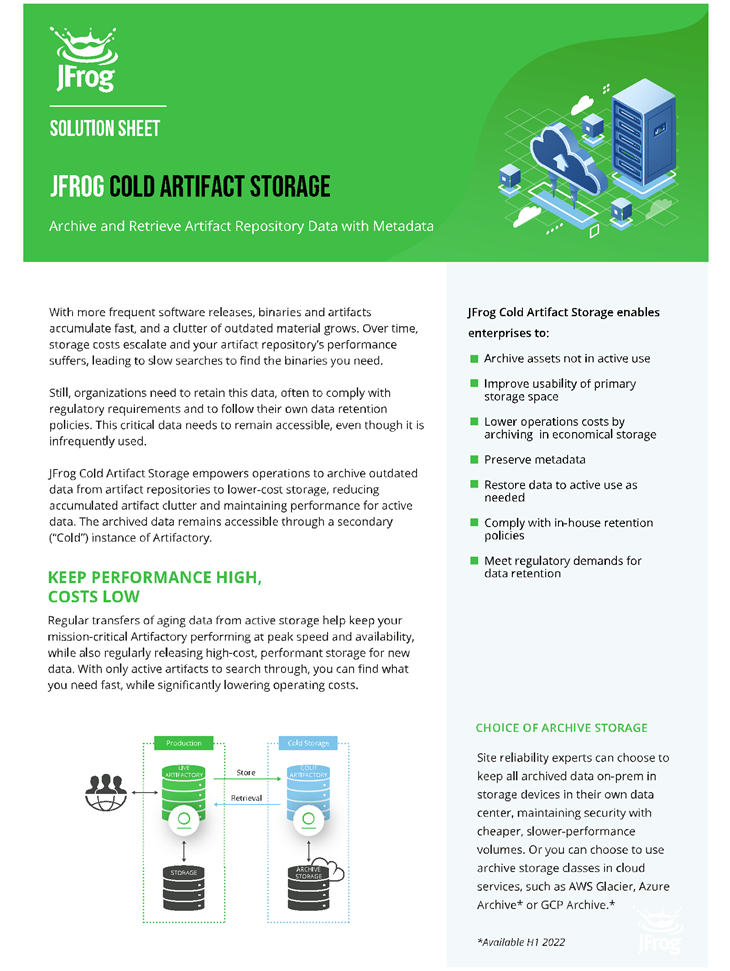JFrog Cold Artifact Storage
Archive and Retrieve Artifact Repository Data with Metadata
With more frequent software releases, binaries and artifacts accumulate fast, and a clutter of outdated material grows. Over time, storage costs escalate and your artifact repository’s performance suffers, leading to slow searches to find the binaries you need.
Still, organizations need to retain this data, often to comply with regulatory requirements and to follow their own data retention policies. This critical data needs to remain accessible, even though it is infrequently used.
JFrog Cold Artifact Storage empowers operations to archive outdated data from artifact repositories to lower-cost storage, reducing accumulated artifact clutter and maintaining performance for active data. The archived data remains accessible through a secondary (“Cold”) instance of Artifactory.
JFrog Cold Artifact Storage enables enterprises to:
- Archive assets not in active use
- Improve usability of primary storage space
- Lower operations costs by archiving in economical storage
- Preserve metadata
- Restore data to active use as needed
- Comply with in-house retention policies
- Meet regulatory demands for data retention
KEEP PERFORMANCE HIGH, COSTS LOW
Regular transfers of aging data from active storage help keep your mission-critical Artifactory performing at peak speed and availability, while also regularly releasing high-cost, performant storage for new data. With only active artifacts to search through, you can find what you need fast.
A JFrog Cold Artifact Storage instance can be configured to use low-cost storage, preserving infrequently used data while significantly lowering operations costs.
CHOICE OF ARCHIVE STORAGE
Site reliability experts can choose to keep all archived data on-prem in storage devices in their own data center, maintaining security with cheaper, slower-performance volumes. Or you can choose to use archive storage classes in cloud services, such as AWS Glacier, Azure Archive* or GCP Archive.* (*Available H1 2022)
ENFORCE DATA RETENTION POLICIES
JFrog Cold Artifact Storage empowers systems administrators to define archiving policies for artifacts and binaries that will be automatically carried out by Artifactory at a specified CRON interval. Admins can specify which repositories will be monitored, as well as criteria for paths, artifact names, and age of last download or deployment. For more specific requirements, criteria can be specified using Artifactory Query Language (AQL). When run, selected artifacts will be removed from the Live Artifactory instance and archived to storage managed by a secondary, Cold Artifactory.
Multiple archiving policies can be defined to support varying use cases or requirements for different teams. Policies can be defined in the UI, through REST APIs or the JFrog CLI, and can be optionally set to expire after a given duration.
MAINTAIN DATA AVAILABILITY
JFrog Cold Artifact Storage archives your metadata along with your artifacts and binaries, helping you to maintain full continuity and traceability of every build you’ve ever produced, even after they’re no longer in production storage.
Your archive storage can be easily monitored and searched from the JFrog Platform single pane of glass, or through Artifactory’s dedicated archive REST APIs. Archived artifacts with their metadata can be restored either to their original location or to a new destination in the production Artifactory, through a background process that will not disrupt other Artifactory use.








